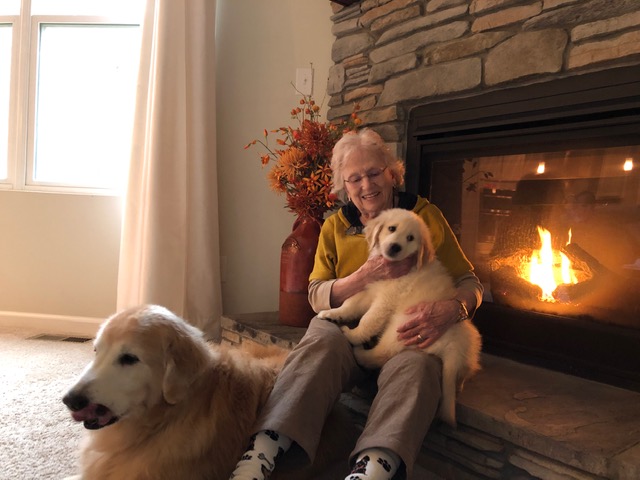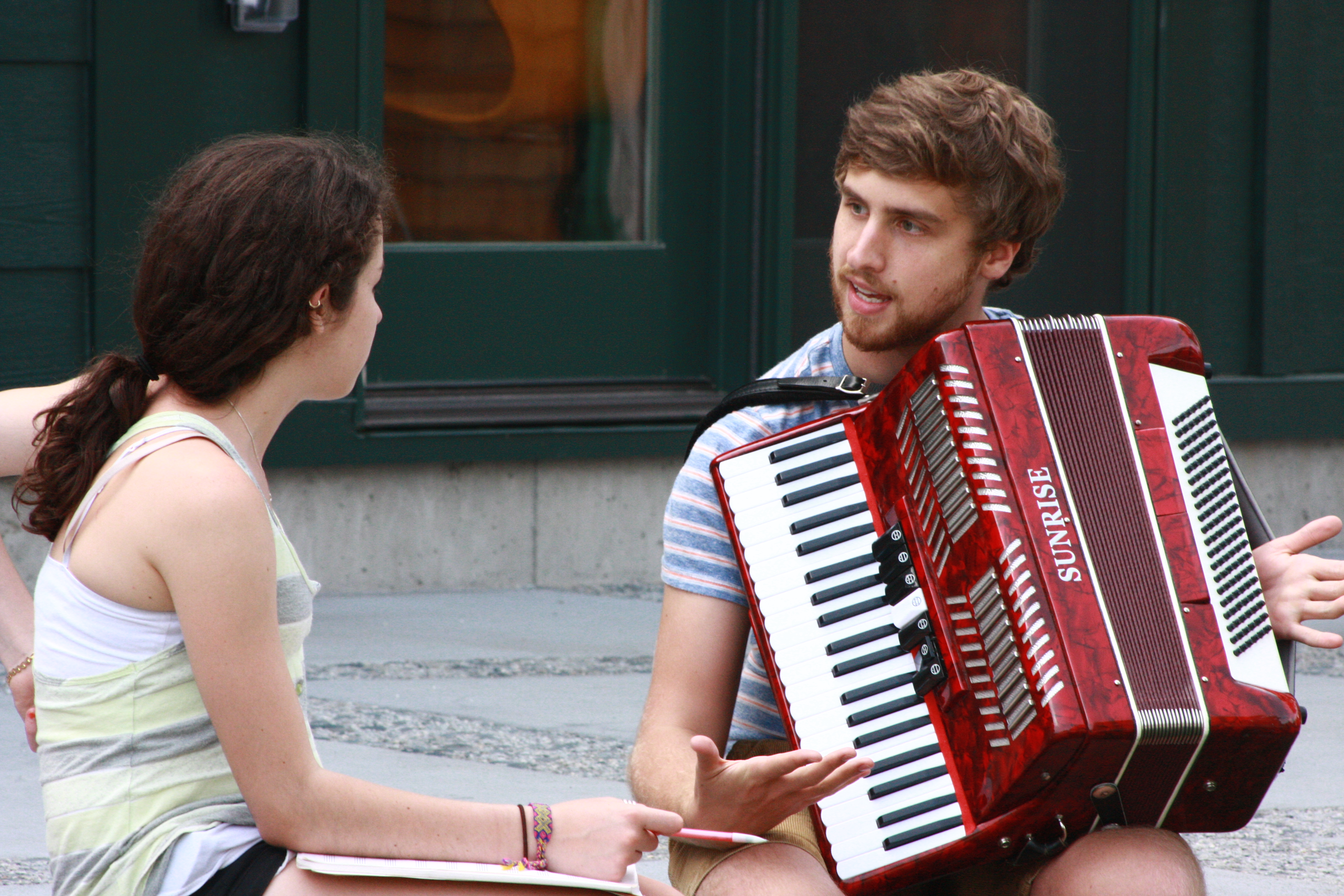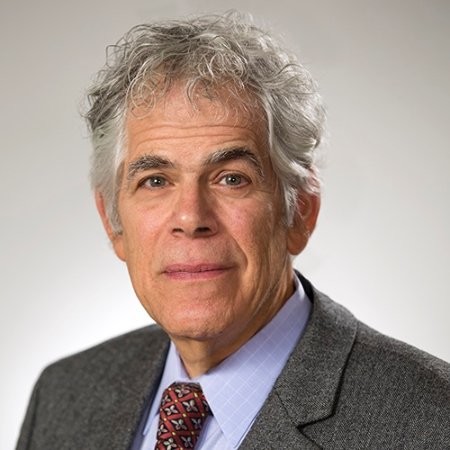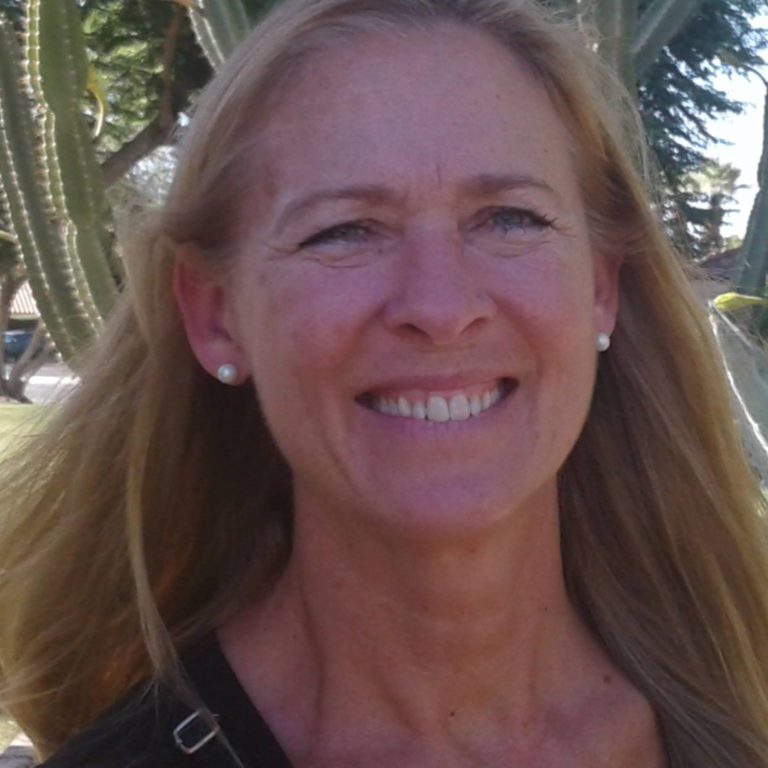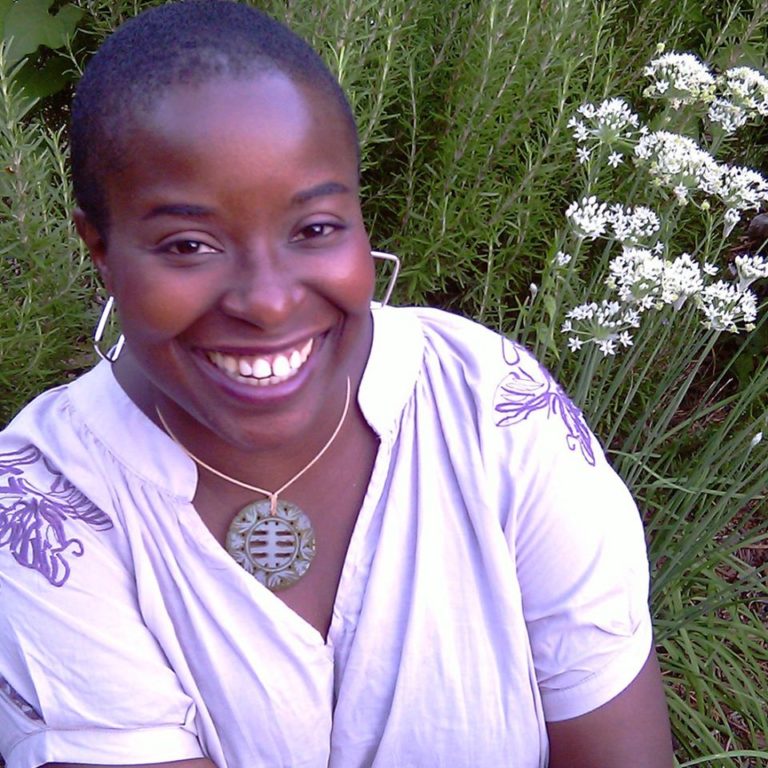In the Spotlight: Renée Favand-See
 In the Spotlight
In the Spotlight
Renée Favand-See
Renée Favand-See a composer and soprano who lives in Portland, Oregon. Her works explore the music of words, of natural and made environments, of emotions and spiritual questions. These investigations yield vocal music of all stripes, Musique Concrète-esque electronic pieces, lyrically driven instrumental music, and counterpoint or the relationships that unfold in the spaces between voices. She is also a Walden alumna and faculty member.
How and when did you relationship with Walden begin, and what has been your involvement since then?
I started going to Walden in 1985, and I heard about Walden from Rosie Hollander, a friend from middle school. So thanks, Rosie! We both loved music–she played the piano, and I sang in a children’s choir in Maryland. She told me about the camp, and I went the next summer. I was there for five summers, starting when I was 12.
Since then, I taught on the Young Musicians Program (YMP) faculty for more than 10 summers. I started when I was a senior at Eastman School of Music. I really appreciated the spirit of apprenticeship in the Walden community; my mentors had been my teachers, and those relationships evolved as we became peers. That was a special experience, and very affirming for me as a young musician. I’ve been teaching at the Creative Musicians Retreat (CMR) since 2015 and have loved that as well. I think all teaching at Walden is connected by a foundation of gratitude. Teachers and students alike are so grateful to be in this incredibly nurturing, stimulating, and creative environment. I look forward to CMR every year, knowing I will feel how much the participants appreciate the experience, a nurturing environment which is unique in adulthood.
Could you describe a favorite memory from your time as a Walden student?
It is hard to pick! There is one memory I bring up often when I’m teaching text setting (how to set text to music). As a student, I wrote a song cycle called Bird Songs, and one of the songs had a text by Walt Whitman from Leaves of Grass. He’s looking up at the sky and he sees a flock of geese, and the poem reads, “Ya-honk! And it sounds down to me like an invitation.” I took the word Ya-honk, and I just went for it in my song, writing, “YA-HONK! YA-HONK! YA-HOOOOONK!” I got grilled in the Composers Forum, and was asked, “Did you have to be so obvious in your text-setting with the word Ya-honk?” It was a type of text-setting where the melody line kind of Mickey-Mouses, really doing what the text means.
That lesson stayed very much on my mind. I write a lot of songs these days, it’s my favorite thing to do as a composer, and I always think about Ya-honk. For the longest time, I put any kind of text-setting thing in the piano, and just kept the voice steady. I was probably 16 when I wrote that piece, and maybe 15 years later, I realized my mistake wasn’t setting ya-honk so dramatically–my mistake was choosing a poem with the word ya-honk in it! What else are you going to do? But that lively discussion has stuck in my mind, and I always tell my students the ya-honk story when we’re discussing tasteful setting of a vocal line of text.
Another memory is from one of my first classes at Walden, which was a eurythmics class with Dede Ondishko. We sat in a circle and the first thing we did was say our names and notice the accent structure. That was when I realized that my name was totally iambic–Renée Louise Favand–and that has stuck with me. These seeds from when I was quite young have taken root and borne fruit in so many ways, all my life. It has been amazing. When I set a text now, the first thing I pay attention to is the natural rhythm of the words. The music of a poem is rhythm-based, so I’m always trying to listen to that. That first exercise where we got sensitized to the accent stress and the syllables of spoken word has been a part of me ever since.
Then of course the hiking and joy of the dances and the joy of singing…just being in your body. Music-making at Walden is embodied in a beautiful way that lives in me now.
Could you describe a favorite memory from your time on faculty?
I had this hotshot group of three girls in my musicianship class who were close friends, all around the same age and were very goofy and playful and sweet. We were doing a dominant-seventh pivot drill, and they were nailing it–they were doing all the resolutions, all the pivots, and it was amazing. It was so much fun to teach them because they were so hungry to learn and so facile with their musical language because of the wonderful grounding they had-they had all been studying Walden musicianship for a few years already. But the V4/3, the second inversion dominant seventh chord, made Danielle Oberdier laugh. Every time we got to singing V4/3, she would just break into giggles. It was a running joke, because we would try to get through the pivot drill and Danielle would start laughing in the middle every time.
Along with that, constantly witnessing students’ excitement around learning and creativity. It’s so inspiring–I learn so much from that and Walden is where I learned to teach. I really felt that beautiful exchange-I was teaching the students and they were teaching me all along the way how to be a better teacher.
I was also thinking about CMR, and we always do Pauline Oliveros’ Rock Piece as an orientation activity. There was one year when we did Rock Piece and the silence after was this velvety, sacred silence. My ears were burst open with bird song and the breeze and the breath and the not-silence of it, and the feeling of connection in our little community that had only been together for a little while but somehow that piece connected us. The sensitive responses of the participants after, how moved everyone was, grew out of how we shared that moment.
Outside of Walden, how are music and creativity part of your life?
I’m a composer, largely of art songs and choral music, and I think Walden planted some beautiful seeds with all the singing we do. I’m also a teacher–I teach composition, theory, and orchestration at Portland State University. And also as a mother! I am realizing that mothering is a very creative activity, and all my training as a teacher is bearing fruit in this other context, which is really interesting. Improvisation is a core idea at Walden, making you flexible in the moment so you can adjust and shift with the direction things are going in. Listening is such a big part of teaching, and such a big part of mothering. Just being in the present moment for what might happen. The first year of mothering felt like a living meditation–“Pay attention. What is happening? Respond in the moment in the most authentic way you possibly can.”–and that is the core of creativity as far as I’m concerned.
I also wrote a song at the beginning of quarantine for my friend Arwen, who is a vocalist. She asked 12 composers to write songs she could sing and play herself. It was such a tricky time with my son’s napping, so I really had to leave the house to compose, but it was early enough in the pandemic that no one was really leaving their houses, and going to my studio felt totally taboo. I actually composed in my car using a water bottle drone. We had this water bottle that made a gorgeous gong-like drone, so I figured Arwen could tap the water bottle and sing. So I composed with a water bottle gong in the car while my son napped. I felt proud of my flexibility in that moment, finding a way through.
What is a non-musical hobby that’s part of your life?
Hiking is probably my favorite. We try to go hiking all through the year, no matter the weather. It’s a way to get the squirrels out of your head if you’re feeling stressed or anxious, just get moving on the trail and breathe. For me, nature is a connector to the sacred. It brings you into the moment; “I’m here now, and this place is so captivating, I’m just here to enjoy it.” My son Morgan, who is turning three, loves hiking. He keeps telling us, “I want to live where I can walk to the woods.” That is a great dream to have. My first taste of hiking was at Walden, and it has been in my life ever since.
What is your hope or dream for Walden’s future?
Just that Walden continues to thrive, bringing deep personal growth to people – participants, teachers, performers, listeners – across all socioeconomic and geographic boundaries, and continues to touch hearts through the sacred ritual of music. Walden is doing that. That’s the amazing thing. It branches out more and more to places all over the world, and tries to offer students of all different backgrounds the opportunity to study there. It’s a healing force in the world, and I just want it to keep sending ripples outward in all these branching, beautiful ways.
In the Spotlight: Theo Trevisan
In the Spotlight
Theo Trevisan
We caught up with Theo Trevisan, an alumnus of the Young Musicians Program, the Creative Musicians Retreat, and, as of this week, the Online Creative Musicians Experience. Theo was on staff at the Young Musicians Program in 2019, and will be participating in Walden’s Summer of Creativity. Stay tuned for updates on Theo’s creative endeavors!
How and when did your relationship with Walden begin, and how do you stay connected now?
In 2012, my mom found out about Walden from one of her friends, a violinist who had heard about it from other performers. I was at another summer camp in roughly the same area of New Hampshire, and when I got back, she pitched Walden to me for the next year to go and compose. At the time, I was very burnt out from traveling with choir and said, “Absolutely not.” A year later she pitched it again, so I went in 2014, and after that I always regretted not going a year earlier. I attended the Young Musicians Program (YMP) from 2014 to 2017, then went to the Alumni Reunion in 2018. I went to the Creative Musicians Retreat in 2019, and was on staff at YMP. I just took part in the Online Creative Musicians Experience last week. Since 2014, I’ve managed to keep a connection with Walden programs each year in some way.
Outside the summers, I stay in touch with the Walden community, with other students who were at YMP when I was. We still post a word of the day sometimes, and other little reminders of the Walden community throughout the year. Since joining the staff, I also keep in touch with faculty and staff members, so I try to stay in touch with all aspects of the Walden community.
Could you describe a favorite Walden memory?
That’s a tough one. Monadnock hikes are always a highlight of the summer for me. Getting to stand at the top and look over everything-especially if it’s a nice day-is a really great thing. The dances are great as well, so Saturdays in general are always fun. The second to last and last Saturdays in particular, when you have so many different events, are great. That last Saturday, when there’s a swim trip, a dance, an open mic, and everything going on, is amazing, but of course bittersweet because it’s the last full day.
Another memory is from 2016, when ICE did a residency at Walden, and some of us got to write pieces for them in advance. That was a great opportunity. But it’s hard to pin down one particular memory.
How are music and creativity part of your life now?
They are still a very large part of my life. I just finished my junior year at Princeton. I’m studying music composition and computer science, so creative activity and generative work is most of what I do. Walden has been really good at helping me think outside the box, which I notice at school as well. I’m very fortunate that when I hear different types of music, I’m not thinking about it in only one conventional way. Walden teaches you from day one that music is sound organized in time, and teaches you to make different connections. There are lots of things you wouldn’t conventionally learn that Walden pushes you to think about. Especially now, with lots of time sitting at home, I’ve found myself surprisingly motivated to compose a lot, so that’s still a huge part of my life, and I plan for it to continue to be that way.
What is a non-musical hobby you love?
I’ve always loved reading. I’d like to do a Great Books program at some point. Particularly before quarantine I was trying to read a bunch of classic books. I just finished Moby Dick, and I’m reading Dubliners now, waiting for some other books to arrive. Last summer at Walden I was working on Paradise Lost in the few moments of spare time I had during the work day.
I also like to play video games, especially strategy games. I’ve been playing more Dungeons and Dragons during quarantine, because it forces you to be social with friends. I’ve been doing a little bit of cooking, and a tiny bit of baking, but reading is probably the biggest non-musical activity right now.
You’re taking part in the Create-a-Thon, and you’re also a donor–why do you give to Walden?
I give to Walden because it’s a way of giving back. The Walden community has been a really important part of my life and my growth as a person, as well as a musician. I want to make sure that opportunity and that community is still there for younger people–and older people–who want to be part of that community. Walden was one of the most important things for me growing up, and I want to make sure that sticks around.
What is your hope or dream for Walden’s future?
I hope that we can all be back in Dublin again in the future. That might sound small, but this is such a challenging time for arts institutions. OCME was great for seeing that the community is still there, even if we’re not in Dublin, and it was great to have that time of being together, but I hope we’re able to gather in Dublin again in coming summers. I’m glad to see the Walden community is holding together, despite everything going on in the world, but I miss Walden, even though I had that online connection. I miss the in-person experience, but I’m also just very grateful to the leadership team and everyone keeping things going. I’m grateful Walden has been such a large part of my life.
In the Spotlight: Tamar Bloch
 In the Spotlight
In the Spotlight
Tamar Bloch
Tamar Bloch spent four summers as a student at the Junior Conservatory Camp (JCC), Walden’s predecessor program, and more than fifteen summers on Walden’s faculty. An accomplished music educator, composer, and performer, Tamar is a wonderful member of the Walden community, and has many stories to share.
How and when did your relationship with JCC and Walden begin?
My lifelong relationship with JCC and Walden began in 1969, as a student at JCC. I had never composed before, and my first summer, I didn’t write a note. During my second summer, I saw that everyone else was composing, so I started as well. I am continually amazed that Grace Newsom Cushman founded this extraordinary summer program in the 1950s, and that her legacy is going strong! It really was a life changing experience for me, in so many ways, and I’m still close with some of my former JCC roommates to this day, including Robin Seto and Sheree Clement. It’s wonderful to have these lifelong connections. My 4 summers at JCC have informed my life as a musician and teacher throughout my varied careers.
What has been your connection with Walden since then?
After spending four summers at JCC, I started teaching at Walden in 1975. Since then, I spent many years on the faculty at Walden, both in Vershire, Vermont, at the Mountain School, and in Dublin for many, many summers. Since then, I’ve moderated composers forums in New York and at alumni reunions. It was wonderful to hear music from alumni and students, and to lead the discussion. I’ve helped organize alumni reunions, and was sorry to miss the last one.
I have always felt a very strong connection with JCC and Walden on a deeply personal level. Now that connection is consciously fostered, but there has always been a sense of community and deep-rooted friendships. During my 15 years living in Budapest, I often taught at Walden during the summers, and it always felt like coming “home.”
Could you describe a favorite memory from your time as a JCC student?
There were so many musical and non-musical wonders. I remember one night Mrs. C woke us all up to go out to watch the northern lights. It was extraordinary, standing outside Burklyn Manor in our pajamas, watching the northern lights. I remember Alan Shewmon playing Chopin etudes, the thrill of singing in a choir, Nelson Max’s films, not to mention the composers forums. In class we analyzed Bartok’s Music for Strings Percussion, and Celesta, still one of my favorite pieces, as well as George Crumb’s Ancient Voices of Children. The mountain hikes were epic, and somehow we made it up and down Mt. Washington!
Could you describe a favorite memory from your time on faculty?
One of my most amazing experiences was Pauline Oliveros’ residency. We did many of her meditations and performed her music. She was an amazing presence, and I had the good fortune to attend her second International Conference on Deep Listening. My experiences at JCC and Walden prepared me for that. Taking on new challenges, trying out new sounds, and being pushed outside your comfort zone were and are ongoing at Walden.
Although I don’t like to single out students or classes, I had one class which we called the “Future Presidents Club.” There were three girls in it who did amazing work. We sang atonal melodies, they could read anything, they sang musically and in tune. Sam Adler, who was composer-in-residence that year, came to my class and complimented me on the beautiful singing. There are so many memories, I could write a book!
How are music and creativity part of your life now?
I really enjoy listening. I love listening to leaves rustling in the air and different bird calls. Just standing still and listening to what’s around me. I also love helping students to open their ears and hear the sounds around them. Right now, I’m preparing to move, which is a huge operation. However, once I move to Rhinebeck, New York, with my partner, I plan on taking lessons with Marilyn Crispell (JCC alumna and past Walden visiting artist), who lives nearby. My first jazz teacher, Ellen Hoffman, is also a JCC alumna — full circle.
What is a non-musical hobby you love?
I’ve always enjoyed cooking and find that to be a very creative activity. I can’t give anyone my recipes because I make them up as I go along!
I love to travel, and I love going to museums, concerts, films, theater, etc. I’m a ‘culture vulture’. I’ve been having movie nights with Peter, my partner, since sheltering in place started, and we’ll get back to traveling when it’s safe, even if that won’t be for a while.
What is your hope or dream for Walden’s future?
One of the great things about Walden is that it’s non-judgmental, and a very safe place to try out new ideas. It’s a safe place to fail–which you do in composing, in life, in everything–and then you figure out how to make it better. Walden is unusual in the depth of mentorship and learning from one another–it’s really free-flowing knowledge, which you certainly don’t find in every teaching situation. I feel that knowledge is to be shared and distributed, not to be held onto. We’ve all gotten the knowledge from somewhere, so I think it’s our duty to pass it on.
I also find Walden is a great place to be able to dream and create, in classes as well as independently. I really love watching my former students grow and become adults and have their own families and careers. It’s great to follow them and see what they’re doing, and I love seeing pictures of their children. That sense of community and connection is so much a part of Walden.
In the Spotlight: Rosemarie Greenwald
In the Spotlight
Rosemarie Greenwald 
Rosemarie and David Greenwald are parents of alumnus Mark Greenwald, who came to Walden for four summers, beginning in 1975. Rosemarie and David have been supporting Walden ever since, and we are so grateful for their generosity. We caught up with Rosemarie to hear some of her Walden memories and hopes for the future.
How and when did your relationship with Walden begin?
I attended Peabody Preparatory from 1973 to 1977, the same time my son, Mark, was there, studying classical guitar. Jim Graham, my musicianship teacher, was on Walden’s faculty, and suggested that my son go to Walden. So Mark went to Walden at ages 14 to 18. He returned to Walden as a visitor in 1979.
What has been your involvement with Walden since then?
My involvement has mostly been as the parent of a former student. My husband David and I used to go up every year for Festival Week and hear the performances of all the students’ works. We also had a reception for Walden in our previous home in the Baltimore area.
Why do you give to Walden?
Mark had such a positive experience at Walden, and we wanted to help give that experience to other children. Mark experienced camaraderie at Walden, and he certainly developed his musical skills. Being an only child, it was important for Mark to share in community, and to learn discipline through music. Being away from home gave him some independence from his parents, and of course, the fresh air and beautiful countryside were great.
How are music and/or creativity part of your life now?
I sang from early childhood and participated in school choirs and musical events. I’m a trained singer; studied with Ruth Drucker when I matriculated and graduated in January 1983 from Towson University, with a major in Vocal Performance. (My husband is often fond of saying he had two kids in college, at the same time.) I continued private study with Ruth for years after, and held my final recital in 2014. I have filled in for cantors; have been a soloist at churches; been a Choir Director; sung at weddings and funerals and was a choir member of my current synagogue. My husband and I are former New Yorkers, and we have enjoyed Broadway shows; the Baltimore Symphony Orchestra, and we continue to hear other concerts at smaller venues. David is not an opera fan, so mostly I went alone to operas in Baltimore and at the Met in New York City. I was also the Administrative Assistant for Arno Drucker’s Festival Chamber Players, and it was Arno who introduced me to computers.
What is a non-music hobby you love?
I love to travel, sew and do machine embroidery and make jewelry in a home studio. Before my knee replacement surgery in April 2018, I was doing yoga. The coronavirus has now curtailed that. I would like to start sewing protective equipment for healthcare workers, as soon as I can.
What is your hope or dream for Walden’s future?
I hope Walden continues to bring musical training to young people from all over the world, and that Walden will have solid funding and the resources it needs for the future. My son got excellent training at Walden, and that’s instilled in him. He didn’t make music his career (neither did I) but it calms our souls.
In the Spotlight: Ian Munro
In the Spotlight
Ian Munro 
Ian Munro attended Walden’s Teacher Training Institute for three summers, and served several years on the faculty of both YMP and CMR, as well as on staff. Ian is one of the wonderful donors whose support makes our program possible. He also gives to Walden by offering his time and care in making beautiful food for Walden events, including our upcoming celebration on March 7.
How and when did your relationship with Walden begin?
In 2008, I was studying with Andrea Clearfield, who has previously been a Composer-in-Residence at Walden. She had heard Walden was looking for participants in the Teacher Training Institute, so she mentioned it to me. Oddly enough, that same week I had gotten a postcard for TTI, maybe by way of the American Composers Forum. It seemed interesting, and I’d never heard of it before. At the time, I was in college and I wasn’t really thinking of being a teacher, but both of these recommendations in the same week struck me, so I applied to TTI. I got really hooked on the approach to musicianship and creativity in music at Walden, so I did three levels of TTI. I joined the faculty as soon as I could when I graduated in 2010.
What has been your relationship with Walden since then?
I was on the faculty for four and half years, which was really great. I taught composition, musicianship, computer musicianship, and some jazz. I taught at the Creative Musicians Retreat for one year, and it was really fun to work with adults on similar material. I really enjoyed that. The half year I mentioned was when I was working fulltime in New York for Face the Music, and Walden partnered with Face the Music to create the Monadnock Institute. We brought 8-10 students to do a two-week, performance-focused version of Walden. Since then, I’ve tried to stay involved. I go to Walden events in New York and I’m a donor, but now that I work full time not in a school setting, I don’t have summers free to work at Walden anymore.
Could you describe a favorite Walden memory?
There’s a lot of them. But one in particular was in 2012, which was sort of the John Cage centennial, marking 100 years since his birth. Matt Gold was a visiting artist at YMP with the Walden School Players, and he put together a massive John Cage celebration. It was a Wednesday night, and there were performances all over the quad–inside, outside, choral works, solo pieces, number works–music all over the place. It was a happening. The YMP students, all these middle and high school kids, were performing and participating and spectating. I thought, “This is the weirdest stuff I’ve ever seen, and everyone is so into it. It’s amazing.”
How are music and creativity a part of your life now?
I play piano. But more than that, creativity is something that Walden really drives home–weaving creativity through everything we do. I’ve had periods when I don’t play as much music, but I express creativity in other ways, such as spending a lot of time in the kitchen, trying a new recipe every night. I’ve gotten really into computer musicianship, working more with web audio, not as much composition, but creating interactive web apps and instruments and interactions. There’s a lot of really cool stuff happening in that realm.
Why do you give to Walden?
I think Walden is a community that has given me a lot, and I believe in giving back. I got a lot from Walden in terms of approach to music, approach to life, seeing transformation happen in kids’ lives over the course of the summer. It’s really important to me that there are places like that in the world, so I give to Walden.
What is a non-musical hobby you love?
I’ll skip cooking, because I already talked about it. I love woodworking. I feel like it’s similar to music and composition in some ways. There’s a lot of planning that goes into it, but the fun part is that you still get to a place where you have a physical connection to the art and craft that’s happening. The actions you take are manifested in what’s created. It’s a good balance to music and cooking.
In the Spotlight: Larry Wetzler
In the Spotlight
Larry Wetzler 
Dr. Larry Wetzler is an alumnus of the Junior Conservatory Camp (JCC), the predecessor program to The Walden School. The JCC was founded in 1952 by Grace Newsom Cushman.
How did your relationship with the Junior Conservatory Camp and Walden begin?
Around the age of 10 or 11, I started taking musicianship classes with Shari Fleming. A few years later, I worked with Mrs. Cushman in her musicianship and theory classes. She would have ongoing potluck dinners at her home on Mt. Vernon Square, just across the street from Peabody. We would all gather for a great meal and some music. When I first attended the Junior Conservatory Camp with Mrs. Cushman in Lyndonville, Vermont, I was about 16 and already felt very much part of the community. I was taking piano lessons with Reynaldo Reyes at the time, and he was also on faculty at the camp.
Could you describe a favorite memory from JCC?
I have so many wonderful memories, but a few favorites. I loved studying Bach. We were analyzing Bach chorales in Mrs. Cushman’s class at Peabody, and at the JCC, we studied one of the Brandenburg Concertos. Reynaldo Reyes performed Bach’s Italian Concerto, and we would sing one of the Bach fugues from The Well-Tempered Clavier.
I’ll always recall Reynaldo Reyes, Zoltan Szabo, and others performing the Ravel and Debussy Quartets. Watching Linda Wilder perform a Martha Graham-inspired modern dance took my breath away.
What is a non-music hobby or activity you love?
For the past 25 years, I have been studying the work of Jacques Lacan, a French psychoanalyst. I attend an ongoing weekly Lacanian psychoanalytic seminar in Manhattan. I find his work fascinating and incorporate much of it into my own psychotherapy practice.
You support Walden in a very special way, by performing piano recitals and asking that attendees donate to Walden, rather than buying a ticket. How did this idea come about?
It came about through my belief in the power of great music to move us into a sacred dimension, transcending our ordinary lives. I want to encourage the Walden project, and enable young musicians to experience some of what I experienced in those early years.
How is creativity part of your life now?
I have written on the interface of music and psychoanalysis. Some of my work appears in the book Music and Psyche: Contemporary Psychoanalytic Explorations.
What advice would you give to would-be Walden students of today as they embark on their summer at Walden?
Be open to the miracle of music and the ways in which it taps into the heartfelt regions of existence beyond words.
In the Spotlight: Dede Ondishko
In the Spotlight
Dede Ondishko
How and when did your relationship with Walden begin?
I was a piano student at Peabody Conservatory Preparatory Department. Peabody required all private students to take music theory, but somehow I was enrolled in both theory and musicianship. I really loved musicianship. Cindy Brackbill was my teacher, and she told me about Walden. My parents got really excited about it, because I was something of a wayward child, so they hoped it would reform me. And it did. In fact, it transformed me. I was a C-student before Walden. I didn’t care about school or improving myself. But then I went to Walden, and I’ve been an A-student and an overachiever ever since! It was like I found the “on” button. I became an engaged person because of my first year experience at Walden.
What has been your involvement with Walden since then?
Today some of my best friends are kids and colleagues I went to camp with. I began as a student in 1974 at age 14 and was a student for four summers. I was on staff for one summer. I was on faculty for seven summers, and I also served a term on the Board of Directors 1998-2004. When I was on faculty, my stepdaughter, Danielle, was 12 and came for the shorter program, and she was hooked! She went every year that she could, then she served on faculty, and now she has joined the Board. As a music teacher I’ve sent my students to Walden. I’m also a contributor, and I’ve held concerts to raise scholarship money for YMP students. I was only able to go to Walden on scholarship, so I really want to thank and repay the people who gave to scholarships and basically paid for me to attend Walden. Walden is family. Like Lynn Hebden said, “You take Walden with you wherever you go.” You never really leave.
Could you describe a favorite Walden memory?
A few years ago, I was interviewed as part of a Teacher of the Year award, and they asked about my favorite teacher, and my answer was David Hogan (we called him Hoagie). I was in my early fifties, but I started choking up right there in the interview, describing how much he gave me as a student. He showed me what I could do! He gave me opportunities no one had ever given me. He was the first teacher who saw what I could do, stood by my side and waited for me. He lit a fire in me!
Another example of that was Saturday hiking at Walden. I was a bit of a laggard, so I was in the last group, which basically went at Sunday-stroll pace-no one really even expected us to make it to the top! I was having fun, but I went to Jeff Hebden, who was on staff as activities director, and I asked if I could move to Group I, the group that was practically running up the mountain. He looked it at me the same way Hoagie looked at me and said, “You want to do it? Okay, go for it!” That Saturday, I hiked in Group I, and I was the first one to the top. This is something I didn’t know I could do, but they believed in me.
I also loved listening to music in a new way. After Goodnight Music, a group of us would go to the listening library, turn off the lights, lie on the floor, and put our heads together like we were spokes of a wheel, and just listen. It was amazing to have this music listening hour with just us kids. We wanted to share the music we liked, and we were expanding each other’s ears. That music sunk in on a level that transformed me, on a cellular level. Having that musical communing with kids my own age was transformative. That’s when I heard Arnold Schoenberg’s Verklärte Nacht for the first time. I think I’ve spent my whole life trying to rewrite and recapture that piece!
How are music and creativity part of your life now?
I went to Eastman for graduate school, and I majored in Music Composition, specializing in Computer Music. After I graduated, I ended up going into computer network engineering, which I was able to do because of my computer music training. But sadly, I stopped playing or writing music! Kyle Horch, a saxophone performer in London who commissioned a series of pieces from me, single-handedly kept me writing. Later, after 12 years of working in computer networking, I realized there wasn’t enough music in my life, so I applied for a job as a public school music teacher, even though it meant going back to school to get licensed. At age 39, I went into teaching music full time, until my husband and I decided to retire. Now I perform all the time as concert pianist and accompanist, as a symphony violist, and I sing in a vocal jazz group. I’m very active as a musician. I recently started writing symphonies-I just finished my third. And I hope to get them performed. I love creating music. Kurt Vonnegut said, “Practicing an art, no matter how well or badly, is a way to make your soul grow,” and I keep that quote above my workstation.
What is a non-musical hobby you love?
Music is intangible, you can’t touch it or hold onto or see what you’ve accomplished so to counter that I’ve picked up some great concrete hobbies. I make paper cards and send notes to my family and friends. I sew. I garden. I play tennis and go biking and do lots of hiking. I just love hiking.
What advice would you give to an earlier-career musician as they are setting out along their path?
If you have the chance to take a music marketing or business class, do not miss out! Learn about promotion, marketing and production, learn how to send out scores and cover letters to perfect strangers. Pay attention, get informed, and reach out for guidance.
You have to feed your artistic spirit. As Vonnegut says, you’ve got to keep creating! Be careful of the gap of what you are doing and what you can imagine, or what you hear other people are doing. We’re at a time when the best artists in the world are so easily accessible, so we can see world class musicians at any time. That can be discouraging! So I’ve learned to say to myself, “I know I’m not there yet, but I have the potential.” I know that because my Walden teachers believed and told me so. As Ira Glass says, “Don’t let the gap get you down!” Even though that gap is always there, you can strive and be happy with those moments when the gap shrinks a little bit. You’ve just got to go for it!
About: Denise Ondishko, Ph.D., is a composer, performer, and educator. Her works cover a wide, eclectic range of genres, including solo piano, solo violin, wind ensemble, orchestra, saxophone and piano, chamber ballet, children’s theatre, elementary school band, and a number of works for live instrument and computer-synthesized tape. Dede won the Northern California Viola Society’s 2018-2019 Composer Competition for her piece, Out of Mud.
Dede is active as a performer and collaborator. She studied at Carnegie Mellon University and the Eastman School of Music. Her teachers included Joseph Schwantner, Warren Benson, Barbara Kolb, David Hogan, and Leonardo Balada. She has done extensive research into the work of computer music pioneer Paul Lansky, a member of Walden’s Advisory Council. She has taught composition at The Walden School and Oberlin Conservatory. In addition to her compositional work and research she has also developed a parallel career as an information technology management specialist.
In the Spotlight: Nnenna Ogwo
In the Spotlight
Nnenna Ogwo
We are so grateful to our donors and the vital support they provide. Your generosity inspires us and ensures generations of musicians find a creative home and lifelong friends at Walden. Whether you are a member of our alumni community, a parent, a visiting artist, a faculty, staff, or Board member, or simply a friend who believes in our mission, thank you.
As we celebrate our donors, we asked Nnenna Ogwo to share with us some of what Walden means to her. Nnenna attended the Young Musicians Program for six summers, was a faculty member and visiting artist, served on Walden’s Board of Directors, and most recently returned to Walden as a Creative Musicians Retreat, and performed at Walden’s 2018 Alumni Reunion.
How and when did your relationship with Walden begin?
I was a student at Peabody Preparatory, and Lynn Taylor Hebden was the director of the Preparatory Department there. She was the one who had made it possible for me to attend Peabody, through scholarships and whatnot. She got talking to my mother, and suggested Walden. I spent six summers at the Young Musicians Program, 1982-1987. Once I got to Walden, it was significant because I had been on a very serious piano track, and so should have been at a more piano-focused camp such as Interlochen, but it wasn’t until my last year of high school that I did that. Walden didn’t take me away from piano, because I still went to Oberlin and majored in piano, got my masters in piano. But I’ve always had an inquisitive mind and been stimulated by different types of learning. That holistic approach to music, even if I wouldn’t have called it that then, was clearly something I was thirsty for. I was a kid who really liked to be challenged, so I loved finding out how music was built, and creating it myself. I had often been in conflict with my piano teacher because I didn’t like to practice the same things, until the summer at Walden I took Pam Quist’s class on Renaissance counterpoint, and after that, I came back from Walden, and my teacher was blown away. She said “This is what happens at Walden? You can go then.” Because normally a teacher won’t have the time to get a student to understand counterpoint.
What has been your involvement with Walden since then?
I was on faculty. I joined the Board while I was still in grad school. I’ve sent students, and I went to the Creative Musicians Retreat in 2014. In July I attended the reunion and performed on the alumni concert. I remember being part of Board conversations, and I was in the board room when we were saying “Why can’t there be a Walden for adults?” so it was amazing to be at CMR as a participant.
What is your favorite Walden memory?
I have to really think about this, because there are so many great Walden memories. My last summer there, I think the guest artist was the New England Brass Quintet. I wasn’t normally down to the wire with scores, but I had worked a lot on the first movement, still had a lot to do, and they were going to be reading my score the next day. That was also the year the older girls were living in the attic floor of the Main House. There were five of us, Kate Hollander, Sarah Brown, Leila Ellis, Rachel Burdick, and me, and we had all known each other a long time. We were realizing that we had all come to Walden at 11 or 12, and we’d heard these amazing pieces and thought we could never write like that, and suddenly here we were writing on that level. It was a really dark and stormy night, and we pulled all our desks into the main foyer, put our desks together, and kept each other company as we did our work. I’d never had that before, people working together like that. If someone finished early, they might take a nap and then they’d come back and help us copy parts. It was really stormy, thunder and lightning, and the lights went out. We were wondering what we would do, and then Lynn Taylor Hebden (aka Mrs. H) came up with a plate of snacks and candles and we got back to it. Most of us were up most of the night. And that moment bonded us. I’m sure we all remember it. My piece that year won an MTNA award and was a runner-up for a national award, but whenever it was acknowledged, I’d think “This was really a team effort.” It takes a village. It was the first time I ever experienced that sort of communal support. It was extraordinary.
Why do you give to Walden?
I was the recipient of scholarships that made it possible for me to experience something musically transformative in the summer. Everything that I contribute to Walden, whether by sending students, giving concerts, past service on the Board or donating is simply about helping to realize that possibility for others.
When you graduate college and get your first real job, your first paycheck, there are all these little indicators that you’re an adult. I sat down with my mom to talk about financial planning, and she said ‘I know you’re not making a lot, but you need to calculate how you want to give.’ And I said, “I’m giving to Walden.” You give to what has impacted you, because you have an intimacy with certain issues. People don’t make consistent gifts to things they’re not deeply emotionally connected to. My time at Walden included some of the most transformative musical experiences I’ve ever had. Because of that, Walden will always be on my list for giving.
Tell us about the roles music and creativity play in your life now.
I’m still a pianist and a teacher, I make my living that way. I started taking jazz piano lessons recently. I realized and had to laugh that I know a lot, but a lot of it is frozen on paper. That often happens with classically trained musicians. Jazz forces you to have working harmonic knowledge in real time. Walden teaches that, even if they don’t put it quite that way, and it’s one of the few places that does. It’s not tied only to jazz. I feel like a real student again, my brain freezes, and it’s funny. Once we’re teaching, we forget, we start to take knowledge for granted where it doesn’t exist yet. It’s good to be reminded how bewildering things were at age 11. In piano, I like to boldly try new things. I’m a pretty good improviser, but then because I’m highly technically trained, I can be very facile, watch my fingers fly and think, ah, that’s what all that training was for.
What would you want to tell a first-time Walden student before they arrive at camp?
I don’t think I would have anything to say. When I send my students, I tell them things to pack on a very pragmatic level. But students normally decide to go because they’ve heard my story. Students get anxious about “Will there be people who look like me? Will I fit in?” and they’ve heard music coming out of Walden and they’re intimidated. But I tell the story of feeling those things, of finding my place, of making lifelong friends.
It’s built into the ethos of the institution—good, decent-hearted people who are also very interesting and creative people. That checks a lot of boxes for who you want to surround yourself with for your life in general. So I just tell students, you will meet some of the most interesting people you’ll ever meet. You will grow in ways you couldn’t have imagined, no matter what people have told you, and your experience will be uniquely your own. You will grow and thrive in ways you can’t elsewhere, you can’t in a year-round school, no matter how good a school you attend. Go forth with an open heart, and see what happens.”[/vc_column_text][/vc_column][/vc_row]
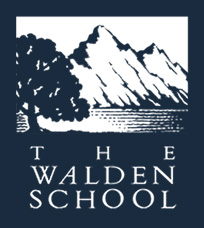
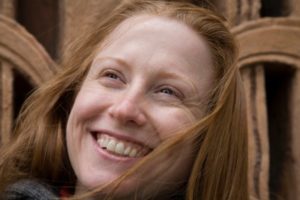 In the Spotlight
In the Spotlight
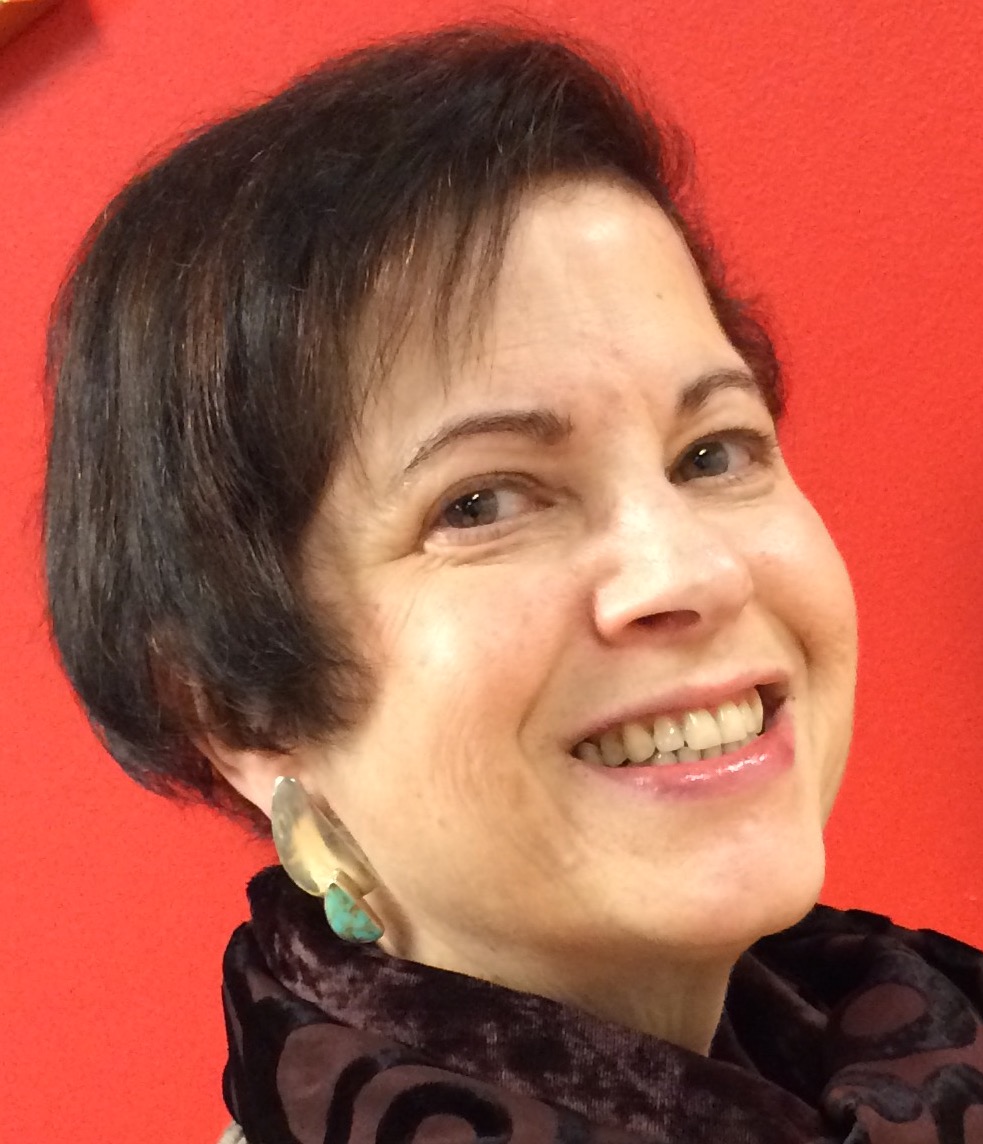 In the Spotlight
In the Spotlight